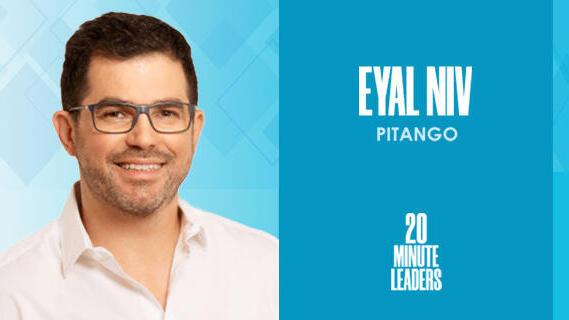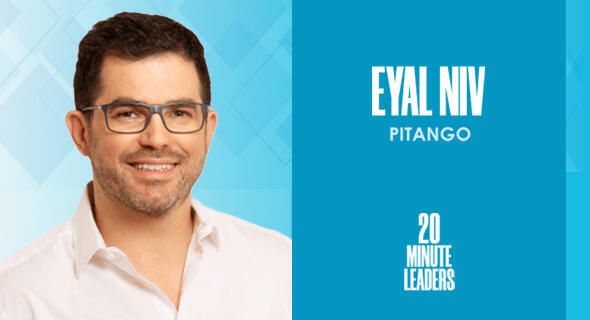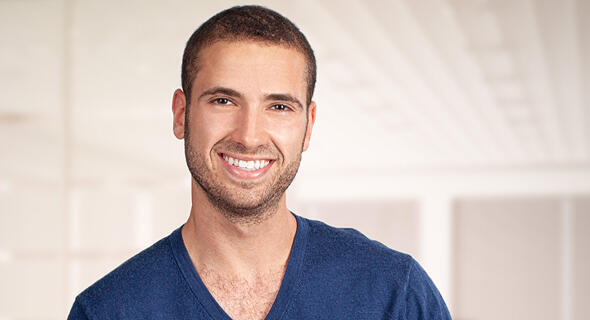
20-Minute Leaders
“We focus on things that would really change the world.”
While many investors are on the lookout for disruptive technology, Eyal Niv, managing partner at Pitango, prefers to think of these world-changing ideas as enablers
While many investors are on the lookout for disruptive technology, Eyal Niv, managing partner at Pitango, prefers to think of these world-changing ideas as enablers. He explains that Pitango focuses on investing in technology that will change the world, but in a way that is positive and enables people rather than replacing them. Once the investment is made, Niv shares that he likes to stay educated about the company’s product and market. But he knows that the founders are the ones making the decisions and he can only make suggestions. He explains that one of his favorite things to help portfolio companies with is building a great team at the beginning to ensure the rest of the journey is smoother. While Niv likes supporting the founders early on, he also shares that it is important to help the companies build their own muscles so they don’t need long-term support.
Click Here For More 20MinuteLeaders
I'm really excited to unfold your journey in Pitango First, but take me back to your own upbringing and what leads you to the intersection of deep tech and investing.
I was born in Israel. I moved to South Africa when I was 12. I really loved technology. I was programming from the age of nine. My father said, "You’ve got to learn how to program."
Was he an engineer?
No. He was an entrepreneur and always forward-looking. I thought, "What the hell, I'm going to start playing with a computer." At the time, it was Commodore 64. He bought the first PC for me. I remember I was so happy. I used to go every day to friends’ apartment, and we used to learn how to program. So that was my first interaction with computers and technology.
I then moved to South Africa, and there, it was more about mathematics. At the age of 16, I started a small company called Super Computers in which we did enterprise application integration. We tried to help research centers, hospitals, and medical centers do research and use PCs while they're using their old systems.
Afterwards, I did everything in reverse. I started a company at the age of 16. I then went to study actuarial science in South Africa. Then after I finished that, I came back to Israel and I went to the Israeli IDF, and I spent some time with unit 217 (Duvdevan), where I had a very meaningful time and I had a lot of interaction with technologies. Some of your listeners would probably know our missions from the Netflix series Fauda.
Then I came out of the army; I was here in Israel and exposed to all these good technologies being developed. I said, "I'm going to start my own company." It was difficult at the time to do it. I said, "I'll start with a VC, and then once I'm done learning about it, I'm going to start my own company." Twenty-two years later, I'm still doing venture capital. But I'm enjoying it.
Take me back to age 16. You’re understanding that technology has the ability to become a catalyst for research centers, hospitals, and enterprises. Where was this understanding from?
At that time, it was more about the necessity of just setting up the PC system and interacting with all the AS400 and mainframes and putting the whole thing together. We needed to build a network and allow computers to speak to each other. It was so difficult because people had to enter information into one system and then go and enter it into another system. You couldn't really research anything because it was all so proliferated.
But at the time, it was more about just putting up a company together with a friend, trying to make some money and feeling independent.
Tell me about Pitango and then your entrance to Pitango First.
Before Pitango, I was with Giza Venture Capital. I was heading their latest fund, and then we split out. Rami Kalish and Chemi Peres said, "Why don't you come join us and form a new focused fund, which will only do seed investments?" It gave me the opportunity to invest in some deep tech and have the capability of making early-stage investments with the ability to do follow-on investments.
What's unique about Pitango is that we have a full stack fund. We can enter a new investment very early on and continue to invest in follow-on investments. We do have a specific seed fund, which is Pitango First. We have a growth fund, as well as a health tech fund.
We are very keen to go into AI, AI processors, AI as a deep technology. We also do quantum computing. We are very oriented toward deep tech. We also have an operational platform. We have six full-time people just doing operational work for our startups, which gives us a unique proposition.
What is the relationship between Pitango First and a company? What does this process look like?
First and foremost, we try and do quite a bit of research before every investment we make. Then post-investment, that partner will try and support the founders in finding the right product market fit, which I think is the most important thing for any founding team. Some of them are more advanced and experienced at doing that, so not every founding team needs the same level of support.
There's a lot of acceleration that needs to happen in the form of hiring, marketing, business development. There's a whole support team that onboards a new company and helps them in accelerating some of these functions. I think the most important thing is to help these companies create their own muscle. The idea is not to support them for a very long time, but rather help them to create that muscle internally.
Already in Pitango First you've backed some of the companies we're proudest of in high tech. They're catalysts for change. Share with me a few of those companies and their stories.
We really try and focus on inflective ideas, things that would really change the world. Some people call them disruptive technologies, but I think that they are enablers more than disruptive.
For example, we see the company called AI21. The idea behind AI21 is creating an AI model that is scalable and much more efficient than any AI model around the world. The marriage between AI and knowledge representation is creating a much more effective framework. They developed their own personal writing assistant, which helps people with their writing. It's called Wordtune. I like to call it Grammarly on steroids. It takes whatever you write, and in real time, it rephrases it and upgrades it. Whether you want it to be longer, shorter, sportier, more polite. Whatever you want it to be, that technology can understand the context of the sentence or the paragraph, and it proves that they are making machines understand long text.
You're also involved with Graphcore, Optibus, Komodor, Lumigo, Stream Elements. What really unifies them is this enablement. How do you see yourself as a part of these journeys?
First and foremost, it is a support role. The founders are the pilots; they are the ones that we need to support. I try and educate myself about their ecosystem and technology and make sure that whatever I say on the board will not interrupt them, but will only add value. My ability to give them good advice is just from the fact that I've seen more companies, rather than ever thinking of myself as having more capabilities. I try and stay modest and understand that they are the ones driving. They have their hands on the wheel, and I can only make a suggestion.
The most important thing as a board member is stay educated about what the company is doing. Have the passion for the product. One thing that I like to help them do is build a top-notch team. From there on, it's a much smoother ride.
You also have responsibility to know whether you're backing a solution that is going to make a positive impact or potentially a negative one. How do you think through that responsibility as you're making these investments?
We have some great companies that I think are really impacting how people are living their lives. ESG is a big part of what we do, and positive impact is a big part of how we do things. We have a full-time person just for ESG, internally and for our portfolio companies. The way we think about it is everything has to be positive and enabling: rather than replacing people, enabling people.
Michael Matias, Forbes 30 Under 30, is the author of Age is Only an Int: Lessons I Learned as a Young Entrepreneur. He studies Artificial Intelligence at Stanford University, is a Venture Partner at J-Ventures and was an engineer at Hippo Insurance. Matias previously served as an officer in the 8200 unit. 20MinuteLeaders is a tech entrepreneurship interview series featuring one-on-one interviews with fascinating founders, innovators and thought leaders sharing their journeys and experiences.
Contributing editors: Michael Matias, Megan Ryan

